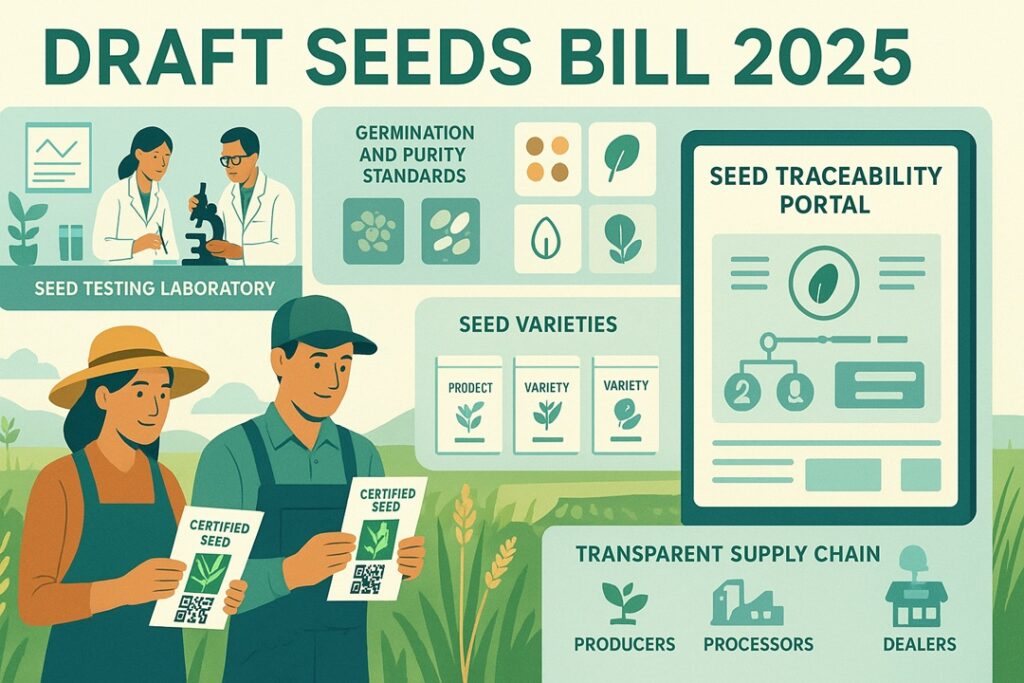Draft Seeds Bill 2025: Reforming India’s Seed Regulation Framework

Context
The Government of India has released the Draft Seeds Bill, 2025 for public consultation. It seeks to modernise India’s seed regulatory framework by replacing the Seeds Act, 1966 and the Seeds (Control) Order, 1983 to ensure quality seeds, farmer protection, private-sector innovation and digital traceability.
Nature of the Draft Seeds Bill
- It is a modern legislation to regulate seed quality across production, certification and sale.
- It introduces transparency through compulsory registration and QR-based digital traceability.
- It is designed to protect farmers and strengthen accountability in the seed market.
Need for Reform
- Existing laws of 1966 and 1983 are outdated due to advancements in hybrid seeds, GM traits and private R&D.
- Earlier reform efforts such as the Seeds Bill, 2004 stalled.
- Rising global trade and demand for quality assurance require updated standards and digital systems.
Objectives of the Bill
- To ensure availability of high-quality seeds with assured germination, purity and health standards.
- To protect farmers from spurious, misbranded and substandard seeds.
- To promote private-sector innovation while reducing compliance burden through decriminalisation.
- To enhance transparency through national digital seed tracking.
Registration of Seed Varieties
- All varieties must be registered based on Value for Cultivation and Use trials.
- Varieties notified under the 1966 Act receive deemed registration.
- Existing cultivated varieties get provisional registration for three years.
- Registration may be suspended or revoked for poor performance or safety issues.
Protection of Farmers’ Rights
- Farmers may save, use, exchange and sell farm-saved seeds except under brand names.
- Farmers are exempt from penalties for selling their own seeds.
- Accountability of seed developers and companies is strengthened.
Quality Standards Framework
- Central Government will notify minimum standards for germination, purity, traits and seed health.
- Mandatory labelling and QR codes ensure traceability and consumer information.
- Misbranded and substandard seeds are prohibited.
Regulation of the Seed Value Chain
- Seed producers, processors, dealers, distributors and nurseries must register with State Governments.
- Central Accreditation System provides deemed registration for multi-state operations.
- This improves ease of doing business while maintaining regulatory oversight.
Certification and Testing Systems
- Establishment and recognition of Seed Certification Agencies with defined roles.
- Strengthened Central and State Seed Testing Laboratories using uniform standards.
- Seed Inspectors and Analysts are given clear powers for sampling, inspection and seizure.
Rules for Seed Imports
- Imports must meet quarantine norms and Indian Minimum Seed Certification Standards.
- Unregistered varieties may be imported for research and trials with approval.
- Ensures global collaboration while maintaining biosafety and quality control.
Digital Seed Traceability via SATHI Portal
- Mandatory onboarding of producers, dealers and research bodies.
- Enables end-to-end tracking to minimise fraud and ensure accountability.
- Enhances transparency for farmers and regulators.
Graded Penalty Structure
- Minor violations attract small penalties or warnings.
- Moderate offences carry penalties up to two lakh rupees.
- Major offences may lead to penalties up to thirty lakh rupees, registration cancellation or imprisonment.
- Farmers remain exempt from penalties for selling farm-saved seeds.
Price Regulation Powers
- Central Government may regulate seed prices during scarcity or monopolistic behaviour.
- Protects farmers from profiteering and market distortions.
Conclusion
The Draft Seeds Bill, 2025 aims to modernise India’s seed sector by ensuring quality, transparency and farmer protection. With digital traceability, updated standards and stronger regulation, it seeks to balance farmer welfare, private innovation and national agricultural needs.
Source : PIB
